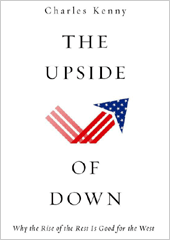How the US Was Smarter Than the UK
Reflections on the art of global power management.
January 31, 2014

Just as the United States overtook the UK in the first half of the 20th century, China is passing the United States in the first half of the 21st.
As recently as 2000, the United States controlled nearly 27% of the world economy and 16% of global trade, dwarfing China’s 8% share of GDP and 4% share of trade. But China surpassed the United States’ trade total in 2012 and (absent a crisis) it will overtake America’s share of global GDP in the next few years.
The United States shares with Britain the fact that there is little it can do to reverse or even slow its relative global decline. That outcome has far more to do with countries like China and India growing at five or seven or even nine percent a year than it does with U.S. economic growth slowing from two to one percent over the past decade.
Benefiting from the developing world
But just as the UK benefited from a stronger America in terms of a trading and investment partner, bilateral flows of goods services and finance between the United States and the developing world are of immense benefit to the American economy and consumers.
Already, industries exporting to the developing world sustain more than six million U.S. jobs. And looking forward, the U.S. is in a strong position to gain from the further rise of emerging markets.
In the future, the United States will benefit from one especially crucial strategic choice made decades ago. Rather than controlling trade and finance through imperial preference like the British Empire had done, America was a team player while at the height of its power (well, for the most part).
Always better to be cooperative
This preference led the creation and shaping of a system of institutions governing trade and finance such as the Global Agreement on Trade and Tariffs (forerunner to the World Trade Organization) and the International Monetary Fund.
These give protections to small and large countries alike in preserving a (slightly more) level playing field in international commercial relations. With China an active participant in both bodies, the U.S. can have some comfort that the country will have to play at least somewhat fair while it is economic top dog.
Being reckless doesn’t pay
And the recent global financial crisis, despite all the pain and economic fallout, suggests one clear political rule: No country worldwide wants to make the mistake of raising barriers to international commerce like the Smoot-Hawley Act did in 1930.
America has other advantages over the UK’s position in 1960. Its relative decline is more gradual, the country has not exhausted itself in World Wars, and the economic underpinning of a global empire has not been dramatically stripped away.
All in all, the U.S. has little to fear from dropping off the top spot. But as its relative decline continues, the importance of returning to America’s cooperative internationalism of the 1950s and 60s only grows.
The United States needs to support the further strengthening of the IMF — even if that means a loss of its veto power in the organization. It needs to push for another WTO round — even if that involves compromises around 100-year copyright terms or protections for Florida’s sugar barons.
If U.S. leaders embrace change (rather than pointlessly attempt to avert it), they’ll do a load of good for America and the world – and would show up Britain once again.
Not only could America outplay the UK as a (comparatively) benevolent hegemon, but it could outperform it in retirement from that role as well.
Editor’s note: This essay was adapted from The Upside of Down: Why the Rise of the Rest is Good for the West by Charles Kenny (Basic Books, 2014). Printed here by arrangement with the author.
Takeaways
The US has little to fear from dropping off the global economic top spot.
As the US declines, the importance of returning to America’s internationalist spirit of the 1950s & 60s grows.
To preserve the system it created, the US must further strengthen the IMF & WTO, even if that means compromise.
The U.S. is in a strong position to gain from the further rise of the developing world.
In the future, the U.S. will benefit from one crucial strategic choice, preferring cooperation over domination.
While the British controlled trade and finance through imperial preference, America made itself a team player.

